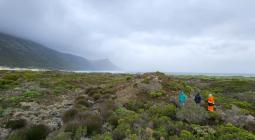‘Incomprehensible’: Madrid plans huge firework display on nature reserve
Opponents lodge legal appeal against Sunday’s planned mascletà, a celebration of noise, near recently restored Manzanares river
Environmentalists and animal welfare groups are protesting against Madrid city council’s plans to stage an especially noisy firework display in a nature reserve created on the recently restored Manzanares river.
Opponents say the mascletà, a celebration of noise rather than light, planned for this Sunday lunchtime will lead to a “massacre” of wildlife, and of birds in particular.
After a legal challenge, a judge in Madrid has given the city council a deadline of 11am on Friday to justify holding the event on the Puente del Rey.
Until recently, the Manzanares was little more than a stagnant piece of water, but a clean-up programme of the stretch that runs through the heart of Madrid began in 2016 and now birds and other creatures have returned to the river, with as many as 134 bird species counted, including egrets, moorhens, Muscovy ducks and mallards.
It is also home to numerous fish, amphibians and small mammals, including otters.
Of all the events the council could have chosen, environmentalists say the mascletà, using 300kg of gunpowder, is the most acoustically damaging to wild animals and pets and can provoke increased heart rates and stress in vulnerable people. A study last year showed that fireworks had long-term negative impacts on wild bird populations.
Prof Kendra Coulter, an authority on animal ethics at Huron University College in Canada, said: “Fireworks are frightening and damaging to all animals. Up to 50% of dogs are terrified. Wild animals are harder to study but there have been instances of birds falling dead from the sky and there was a case where birds were so terrified they flew so far out to sea they were unable to get back to land alive.”
Dogs may suffer permanent hearing loss. The American Society for the Protection of Animals estimates that a fifth of pets that disappear do so as the result of loud noises from either fireworks or thunderstorms.
“There may be people on the autism spectrum in the area who would also be affected but at least we can warn them,” Coulter said. “The animals get no warning. Birds will fly off and if they’ve begun nesting some won’t be able to find their way back to their nests.
“As a species we are very capable of coming up with a range of ways to celebrate events while causing the least possible and, ideally, no damage to other species, and to find more respectful ways to celebrate.”
María Dolores García of the Animal Rights law practice, said: “It’s incomprehensible that of all places they should choose to hold the mascletà here. It can only be out of ignorance.” The firm has brought a legal challenge to the plan on the grounds that the proposed site, around the Puente del Rey, is a protected area under Spain’s heritage laws.
“Our natural heritage, our living heritage, should have priority over any event that might harm it,” García said. “It shows total contempt for wildlife.”
Rita Maestre, a spokesperson for the political party Más Madrid, said it was not even clear if the event, estimated to cost the taxpayer €46,000 (£39,000), had obtained the necessary permission to go ahead.
“There are no permits, no reports and no contracts,” Maestre said. “All we have is a serious threat to the wildlife in a protected area.”
García accused the local authority of “obscurantism” apparently designed to make it impossible for those opposed to the event, who include ornithologists, environmentalists and residents’ associations, to do anything to stop it.
Mascletàs (bangers) are part of the Valencian tradition of fireworks and form part of las fallas, a festival held in Valencia in March, when neighbourhoods compete to create the most spectacular floats. At the end of the festival all the floats are set on fire. María José Catalá, the mayor of Valencia, dismissed critics of Sunday’s mascletà as “bumpkins”.
The proposed mascletà on the Puente del Rey is part of a joint Madrid-Valencia programme to attract tourists to the two cities.
Cover photo: Las fallas celebrations in Valencia last year, which ends with floats set on fire and fireworks. The proposed mascletà in Madrid is part of an initiative to attract tourists to the two cities. Photograph: Biel Aliño/EPA





